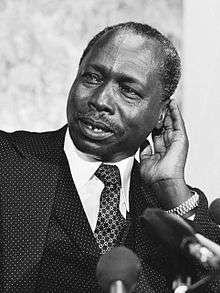1988 Kenyan general election
General elections were held in Kenya on 21 March 1988. At the time, the county was a one-party state with the Kenya African National Union as the sole legal party. The size of the National Assembly was expanded from 158 to 188 seats prior to the elections. Although the post of President of Kenya was due to be elected at the same time as the National Assembly, Daniel arap Moi was the sole candidate and was automatically elected without a vote being held. Following the elections, a further 12 members were appointed by President Moi.[1]
| ||||||||||||||||
| ||||||||||||||||
| ||||||||||||||||
1988 Kenyan parliamentary election | ||||||||||||||||
This lists parties that won seats. See the complete results below. | ||||||||||||||||
| ||||||||||||||||
.svg.png) |
|---|
| This article is part of a series on the politics and government of Kenya |
|
|
|
Administrative divisions |
|
|
|
Economic schemes |
|
|
Background
In February 1988 a new system was introduced for the primary elections of KANU candidates. The mlolongo or queue system involved party members lining up behind photographs of their preferred candidate.[2] In a country of 20 million people, 4,528,480 were KANU members, and there were accusations that the mlolongo system resulted in voter intimidation and fraud during the primaries.[2] Beyond, a church-based magazine was banned after it condemned the public voting as "a mockery of justice."[2]
Results
| Party | Votes | % | Seats | +/– |
|---|---|---|---|---|
| Kenya African National Union | 2,231,229 | 100 | 188 | +30 |
| Invalid/blank votes | 33,152 | – | – | – |
| Total | 2,264,381 | 100 | 188 | +30 |
| Registered voters/turnout | 5,562,981 | 40.70 | – | – |
| Source: IPU | ||||
Aftermath
At the first meeting of newly elected Assembly in April 1988, Fred Mbiti Gideon Mati, who had been Speaker since 1970, resigned, and the National Assembly elected Moses Kiprono arap Keino as his replacement.
References
- History of the Parliament of Kenya Archived 2009-08-06 at the Wayback Machine Parliament of Kenya
- In One-Party Kenya, Election Is Questioned New York Times, 24 March 1988]
